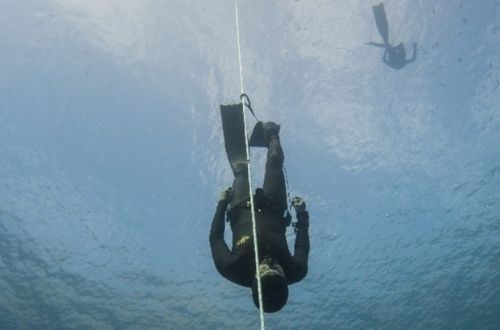When you start freediving, a classic and quite normal mistake is to raise your head to look towards the bottom, towards where you are going. This is of course one of the errors that we try to correct as a priority, for several reasons:
- First of all, we want to eliminate any risk of injury, and stretching at depth is a particularly important potential source of injury.
- Secondly, we want to have an efficient hydrodynamic position that will make us produce as little effort as possible and therefore improve our oxygen consumption. It is, therefore, necessary to favor a “neutral” position that will be more restful.
- Moreover, the equalization will be easier with the chin in a neutral position.
- And finally, having the line in front of you is the best reference point to adjust your finning or freefall position when these elements are not yet 100% acquired: by looking down, you will lose this particular reliable reference point and your technique may suffer.
However, in addition to the body/head position, which is particularly important, I frequently correct the “eye” position of my students.
Indeed, once I ask them to keep the head and the body in a neutral position, some of them always want to look down and will look (often unconsciously) towards the ball while raising the head as little as possible. One could easily say to oneself “why not”: since finally the essential is safe! Is trying to correct the orientation of the eyes should be then seen as being “over picky”?
In my opinion, not. The position of your eyes will have a direct impact on your mental state. If you look towards the ball, if you look where you are going, you automatically project yourself into the future, your “goal” is to reach the bottom, you are mechanically in “challenge mode”. Conversely, if you look straight ahead, you will be more inclined to stay focused on the present moment, on your feelings, on your sensations, which will only improve. If the line has been placed at a depth that corresponds to you, you don’t have to ask yourself if you’re close or not, you don’t have to ask yourself where you are, you only have to concentrate on your technique and your equalization, the rest is anecdotal. You will see that reaching the end of the line will become almost a surprise, you will no longer say to yourself “cool at last!” but rather “ah well already? Okay, turn around then”.
As I mentioned above, some divers are not always aware of the direction of their gaze and it is often unconsciously that they look down (you often have to show them the video of their dive for them to be convinced!) An exercise I frequently give when students continue to look down unconsciously is to focus on the surface: during the descent, it is always about having the line in the foreground but constantly having the surface in the field of vision: not the surface just above, the distant surface is enough. This usually helps to find an adequate mental state which will only make your dives easier and more enjoyable.

